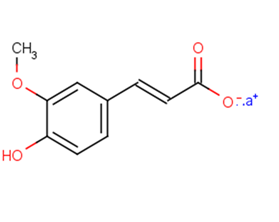
Sodium ferulic
CAS No. 24276-84-4
Sodium ferulic( Sodium ferulate )
Catalog No. M18293 CAS No. 24276-84-4
Sodium ferulate (SF), the sodium salt of ferulic acid, is a drug used in traditional Chinese medicine for treatment of cardiovascular and cerebrovascular diseases and to prevent thrombosis.
Purity : >98% (HPLC)
 COA
COA
 Datasheet
Datasheet
 HNMR
HNMR
 HPLC
HPLC
 MSDS
MSDS
 Handing Instructions
Handing Instructions
| Size | Price / USD | Stock | Quantity |
| 100MG | 41 | In Stock |


|
| 1G | 50 | In Stock |


|
Biological Information
-
Product NameSodium ferulic
-
NoteResearch use only, not for human use.
-
Brief DescriptionSodium ferulate (SF), the sodium salt of ferulic acid, is a drug used in traditional Chinese medicine for treatment of cardiovascular and cerebrovascular diseases and to prevent thrombosis.
-
DescriptionSodium ferulate (SF), the sodium salt of ferulic acid, is a drug used in traditional Chinese medicine for treatment of cardiovascular and cerebrovascular diseases and to prevent thrombosis.
-
In Vitro——
-
In Vivo——
-
SynonymsSodium ferulate
-
PathwayOthers
-
TargetOther Targets
-
RecptorOthers
-
Research AreaCardiovascular Disease
-
Indication——
Chemical Information
-
CAS Number24276-84-4
-
Formula Weight216.16
-
Molecular FormulaC10H9NaO4
-
Purity>98% (HPLC)
-
SolubilityDMSO : 16.6 mg/mL 76.79 mM;
-
SMILESCOC1=C(C=CC(=C1)C=CC(=O)[O-])O.[Na+]
-
Chemical Name——
Shipping & Storage Information
-
Storage(-20℃)
-
ShippingWith Ice Pack
-
Stability≥ 2 years
Reference
1.Lampiasi N, et al. The molecular events behind ferulic acid mediated modulation of IL-6 expression in LPS-activated Raw 264.7 cells. Immunobiology. 2015 Nov 10.
molnova catalog



related products
-
Neuromedin U, rat TF...
Neuromedin U, rat TFA is a 23-amino acid brain-gut peptide.
-
TC-067533
TC-067533 is a Papain-like protease inhibitor with an IC50 of 8.7 μM.
-
Tyrosine Kinase Pept...
Tyrosine Kinase Peptide 3 [RRLIEDAE-pY-AARG], Acetylated, Amide, Phosphorylated



 Cart
Cart
 sales@molnova.com
sales@molnova.com


